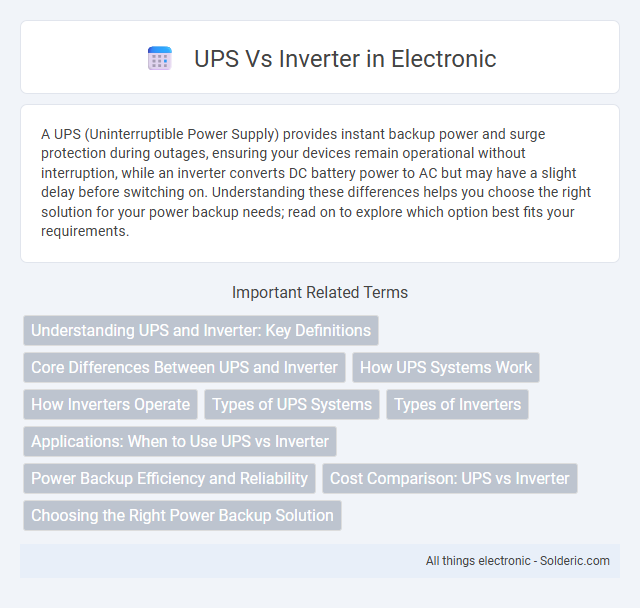A UPS (Uninterruptible Power Supply) provides instant backup power and surge protection during outages, ensuring your devices remain operational without interruption, while an inverter converts DC battery power to AC but may have a slight delay before switching on. Understanding these differences helps you choose the right solution for your power backup needs; read on to explore which option best fits your requirements.
Comparison Table
| Feature | UPS (Uninterruptible Power Supply) | Inverter |
|---|---|---|
| Purpose | Provides immediate backup power during outages | Converts DC battery power to AC during power cuts |
| Power Backup Time | Short duration (minutes to an hour) | Longer duration (hours, based on battery capacity) |
| Switching Time | Milliseconds (almost instant) | Delay of a few seconds during power transition |
| Ideal Use | Computers, servers, sensitive electronics | Home appliances, fans, lights |
| Battery Type | Sealed lead-acid or maintenance-free batteries | Lead-acid or tubular batteries |
| Cost | Higher upfront cost | More affordable for longer backup needs |
| Power Wave Output | Pure sine wave output | Modified sine wave or pure sine wave (depends on model) |
Understanding UPS and Inverter: Key Definitions
A UPS (Uninterruptible Power Supply) provides immediate battery backup during power outages, ensuring zero downtime for your critical devices by switching instantly to stored energy. An inverter converts DC battery power into AC electricity, typically activating only after a power failure, resulting in a brief delay. Understanding these key definitions helps you choose the right backup system for your power continuity needs.
Core Differences Between UPS and Inverter
UPS systems provide instantaneous power backup by utilizing internal batteries, ensuring zero transfer time during power outages, whereas inverters convert DC battery power to AC with a slight delay in switching. UPS devices typically include built-in surge protection and voltage regulation, maintaining consistent power output suitable for sensitive electronics, while inverters generally rely on external battery banks and may require additional stabilizers. The core operational difference lies in the continuous readiness of UPS systems to supply power without interruption, contrasting with inverters that activate power conversion only upon detecting an outage.
How UPS Systems Work
UPS systems provide continuous power by instantly switching to battery backup when a power outage or voltage fluctuation occurs, ensuring your devices remain operational without interruption. They use an internal battery charged during normal power supply to deliver clean and stable electricity during outages or disturbances, protecting sensitive electronics. Your equipment benefits from this seamless power transition, preventing data loss and hardware damage during unexpected power failures.
How Inverters Operate
Inverters convert direct current (DC) from batteries into alternating current (AC) to power household appliances during outages. They rely on stored energy within battery banks and do not provide protection against power surges or voltage fluctuations. Unlike UPS systems, inverters introduce a brief power transfer time, typically ranging from a few milliseconds to seconds, before supplying backup electricity.
Types of UPS Systems
UPS systems are categorized into three main types: offline (standby), line-interactive, and online (double-conversion). Offline UPS provides basic power backup by switching to battery during an outage, suitable for low-power devices. Line-interactive UPS offers voltage regulation with battery backup, ideal for small to medium businesses, while online UPS continuously converts power to ensure zero transfer time and clean power, essential for sensitive or critical equipment.
Types of Inverters
Inverters come in several types, including pure sine wave, modified sine wave, and square wave inverters, each differing in output quality and efficiency. Pure sine wave inverters provide the cleanest power, making them ideal for sensitive electronics, while modified sine wave inverters offer a more cost-effective solution for basic appliances. Understanding these types can help you select the right inverter based on your power needs and device compatibility.
Applications: When to Use UPS vs Inverter
UPS systems are essential for protecting sensitive electronics and critical equipment during power outages by providing instant, uninterrupted power, making them ideal for computers, servers, and medical devices. Inverters are more suitable for general household use and longer backup durations where immediate power continuity is less critical, powering appliances like lights, fans, and refrigerators. Your choice depends on the need for seamless power transition and the type of devices you want to support during an outage.
Power Backup Efficiency and Reliability
UPS systems provide instant power backup with no transfer time, ensuring continuous and stable electricity supply, which is crucial for sensitive electronics and critical operations. Inverters rely on battery power but involve a slight delay during the switch from mains to battery, potentially causing brief interruptions. For your power backup needs, a UPS offers higher efficiency and reliability in maintaining consistent power without disruptions.
Cost Comparison: UPS vs Inverter
UPS systems typically have a higher upfront cost compared to inverters due to advanced technology and built-in surge protection features. Inverters are generally more affordable initially but may incur additional expenses for battery replacements and maintenance over time. Evaluating total cost of ownership, including energy efficiency and lifespan, is crucial when comparing UPS versus inverter investments.
Choosing the Right Power Backup Solution
Choosing the right power backup solution depends on your specific needs for power stability and duration. A UPS provides immediate, short-term power with surge protection, ideal for sensitive electronics and preventing data loss during brief outages. Your choice should consider whether you prioritize instant switching and power conditioning (UPS) or longer backup times suitable for extended outages (inverter).
UPS vs inverter Infographic

 solderic.com
solderic.com